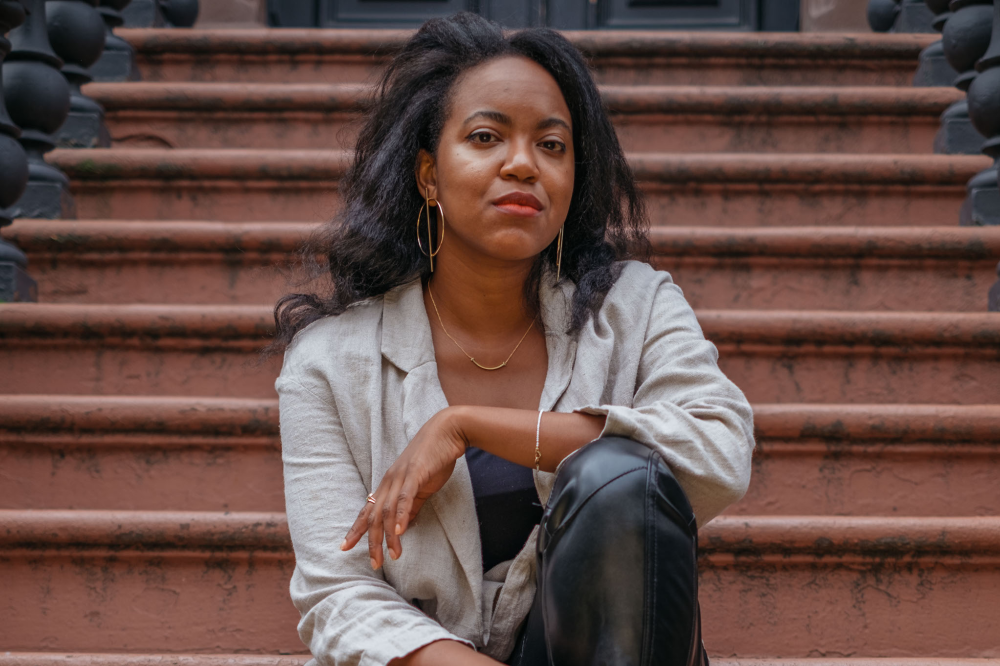Culture
 Whitney White. Photo by Melissa Bunni Elian.
Whitney White. Photo by Melissa Bunni Elian.
STC’s Whitney White Approaches the Classics Through a Contemporary Lens
March 12, 2021 @ 10:00am
For Whitney White, classic works of theatre like those by Shakespeare and Arthur Miller not only stand the test of time, they tell the stories of today. After directing James Baldwin’s “The Amen Corner” at Shakespeare Theatre Company in February 2020, White was hired as an associate director at the theater, where she helps develop artistic works and programming with a focus on diversity and inclusion. The Brooklynite talked to District Fray about approaching the classics through a contemporary lens, and the importance of inclusivity in theatre – both on and off the stage.
District Fray: What drew you to the world of theatre?
Whitney White: My gateway to theatre was music. I started singing right away in the choir. The first play I was ever in was a production of “Rumpelstiltskin.” Interestingly enough, I loved performing. But I never knew that theatre could be for me. I think it’s really interesting how many barriers can be up in the world of arts. It can be a very cost prohibitive world you’re discouraged from because people don’t see it as valid. I understand all those barriers, but storytellers are storytellers, and they should have avenues to express themselves. I came to the world of theatre as a performer, then found that I wanted to tell stories in a more world-encompassing way. That is how I found directing and writing.
How can the classics be approached in an inclusive way?
I never really understood the exercise of doing a Shakespeare play and trying to recreate it just exactly as Shakespeare did it. We were not alive then. Shakespeare was a living playwright responding to the conditions, culture and world around him in the now. Why wouldn’t we use his texts to respond to the now that we are living in? It just seems natural to me. I’m a Black woman living in the now. When I read “The Crucible,” a play about a teenage girl who falls in love with a married man who doesn’t treat her well, and she stands up and says, “You can’t treat me this way, I’m going to set this town on fire,” I find that very contemporary. I don’t have to pretend I’m a Puritan in that settlement. I can explore it as a woman would in the now. I feel like treating classics with this contemporary lens is more honest. I’m not going to be so egotistical to assume that I’m going to recreate Arthur Miller’s production. I’m going to make a production that reflects the world I live in.
How will the increased focus on racial justice in the United States impact the theatre industry?
We’re living in a time where so many things have been exposed. It’s not that they haven’t been there, but because of this pause we’ve all been in, we have time to look at things we haven’t been able to look at before. Exploring racial justice both onstage and behind the stage – in terms of who is in leadership positions, who has the power, who has the authority, who has access to funding, who has the right to play in the American theatre – I think it could all have really positive outcomes. Art making will only get better if everyone is invited to do it to the best of their ability. And therefore, our conversations and political discourse will also be better.
Why is it important to have diversity off the stage in theatre?
People are very used to persons of color entertaining them. I’m sure half of the people who might read this article could sing a Cardi B or Beyoncé song, or they loved Michelle Obama’s outfit at inauguration. But when you look at the people who own the theaters nationwide, run the stages and approve the budgets, you’re looking at almost no diversity at all. There’s a reason why a small percentage of plays on Broadway have been written by Black people. Until we have greater diversity behind the scenes, not much will change structurally. It’s not just about who’s entertaining you onstage, it’s about who’s making the decisions.
What advice do you have for other Black women in theatre?
Keep at it. Find your voice. If there’s a story you’re passionate about and interested in, keep at that story. Find a way to make the art you want to make right now. Don’t wait for someone to give you permission to do it.
What is special about working in D.C. compared to other cities?
Besides Ted’s Bulletin, which makes the best fried chicken sandwich I’ve had in a long time, I think what makes D.C. so special is that it has a thriving theatre community. Woolly Mammoth, Ford’s, Signature – there’s all these incredible theaters there that are each producing their own unique work. What makes D.C. most exciting for me is the possibility for conversation. You can do a play where you feel like you’re really in dialogue with an audience from lots of different sectors. You’re not getting the same group of people every show. Ruth Bader Ginsburg came to one show, “The Amen Corner,” and that was such a gift. And there are also people coming from outside the D.C. and tristate area.
How has Covid changed the work you do at Shakespeare?
I think the pandemic has made me rethink accessibility. Theatre is very cost prohibitive. It remains an elitist art form in that way. Not everyone can go upstairs to get to their seat. Physical and socioeconomic accessibility is what Covid is making me think about. How can we give more away to
more people?
What kind of projects are you working on?
I’m working on an incredible play by Aleshea Harris. It’s called “On Sugarland.” I think it’s one of the best plays I’ve ever read in my life. It packs so much soul power – emotional, visceral power that brings you to your knees – and also, things that make you laugh so hard. It’s just an incredible play. “The Crucible” is the other thing. We’re dreaming on that being in-person later this season, but I’m also scheming on what sort of awesome digital content we can put forward.
Favorite play? “Buried Child” by Sam Shepard. Favorite musical? “Passing Strange” by Stew. Must-go place in D.C.? Ted’s Bulletin. Last theatre performance you saw in person? It was a production of “My Brilliant Friend” in London at the National Theatre, and it was stunning. What are you looking forward to this year? The audience. I’ll never take an audience for granted again. What was your favorite acting role? Lady Macbeth. I performed this series of concert plays with my band called “Reach for It.” I played a Lady Macbeth inspired by Tina Turner. Dream role? My collaborators and I just wrote a new kind of musical theatre piece called “Capsule.” We really hope to do that live, and that would be a dream role. Dream actor or actress to work with? Angela Bassett and Mahershala Ali. What are three words you would use to describe yourself? Hopeful, enthusiastic, rigorous. What is Shakespeare Theatre Company’s best work? All the work they’ve done in dialogue with the now has been their best work, which is a lot. What about Shakespeare the writer? “Richard III,” hands down. What is a song you’ve been listening to lately? I really love “Agoraphobia” by Deerhunter.
Learn more about White at www.whitney-white.com. Stay updated on Shakespeare Theatre Company’s current season at www.shakespearetheatre.org or follow @shakespeareindc on Instagram.







